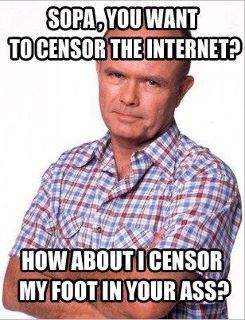SOPA and its ramifications.....
WyldJitt
Published
01/20/2012
 Theres really only one way to deal with this SOPA nonsense.... We steal the Declaration of Independence.....
Theres really only one way to deal with this SOPA nonsense.... We steal the Declaration of Independence.....
If you're reading this, chances are you already know that the Internet can't stop talking about SOPA right now. And you're probably aware of the overwhelmingly negative reaction it's provoked in web giants like Wikipedia, Google, even Facebook; maybe you even signed a petition to kill the Act. But you may not know what it actually says--and what the consequences actually are. And as a website that relies on data, our own and other's, Kapitall could be directly affected by its ramifications. Courtesy of the Wall Street Journal and Gizmodo, we summarized a few key points to take away:
What is SOPA anyway?
It's actually two bills: as presented before the House, it's the Stop Online Piracy Act; while the Senate is considering PIPA, an acronym for Protect IP (Intellectual Property). The idea is to crack down on foreign websites that sell pirated movies and music, as well as other products.
How would SOPA work?
The Justice Department would get new powers to keep US companies from providing funding, advertising or linking to these foreign sites. They could force a search engine like Google to disable links to these sites, or block users from typing the URLs into their browsers.
Who stands to benefit from SOPA?
Hollywood studios and record labels, yes, but really anyone who owns content that's being pirated.
That sounds fair enough.
So what's the problem?
While it's foreign sites that are the intended targets, the ramifications of SOPA would most certainly be felt here in the US, unfairly targeting sites that unwittingly posted pirated content. Theoretically, a media company could get a court order against a perfectly innocent site, punishing them by blocking payments and shutting them down. And payment processors and content providers like YouTube or Visa could essentially bypass the courts altogether if they wanted to shut down a site they deemed guilty of infringement. Gizmodo, citing Public Knowledge, notes that "Google could easily take it upon itself to delist every viral video site on the internet with a "good faith belief" that they're hosting copyrighted material. Leaving YouTube as the only major video portal." It's a little conspiracy theory but worth keeping in mind.
Of course, there are always two sides to every story
Traditional media companies like Comcast, News Corp and Viacom, some of the key players fighting for this legislation, feel they've been victimized by Web piracy, and are currently powerless to defend what is rightfully theirs. Can we blame them for trying?
After yesterday's protests, it's unlikely that SOPA will be able to recover. But one thing's for certain--we'll all be watching to see how it all plays out.






5 Comments